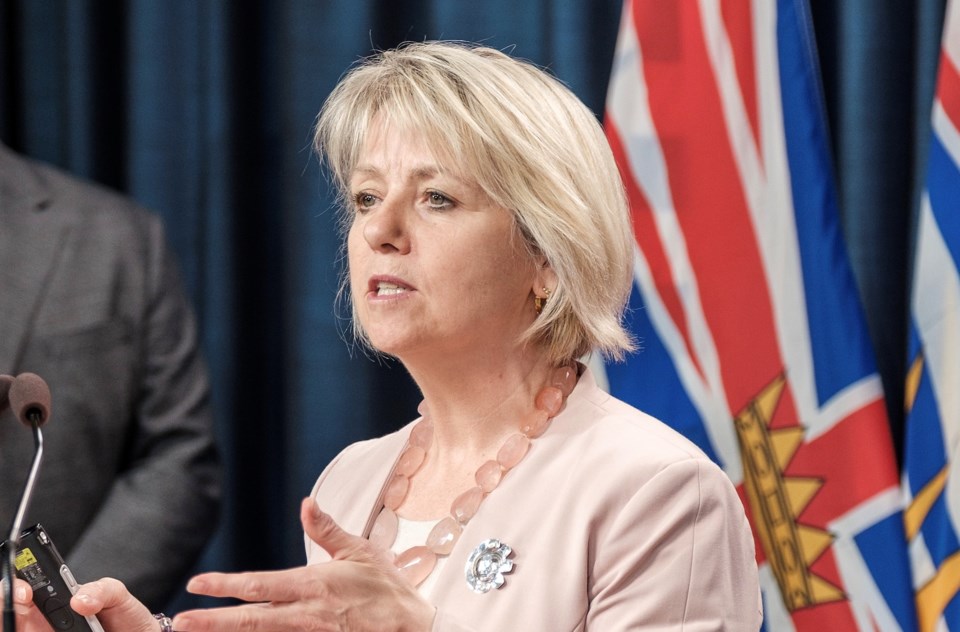B.C.'s steady rise in newly discovered COVID-19 infections continued April 8, with a record 1,293 cases detected in the past 24 hours, provincial health officer Bonnie Henry told media.
She added that researchers had used a different system to calculate the data, and that the data might be revised when the province's regular system is once again up and running.
Health officials also conducted 12,332 tests in the past day, which is more in a single day than they have in many weeks.
To help combat the spread of the virus that has spawned a global pandemic, Henry said she was putting in place a new health order that allows WorkSafeBC inspectors to work under the Public Health Act to be able to shut workplaces down for 10 days or more when they detect outbreaks that involve workplace transmissions that involve three or more people.
Henry called the order an "ongoing evolution" of the program that the province has had for workplaces.
There have now been 108,278 COVID-19 infections detected since the first case was identified in January, 2020. Of those, about 90%, or 97,462 people are considered by the province to have recovered.
Health officials are closely monitoring a record 15,203 people for symptoms as a result of those individuals having had known contact with identified cases. That number is up by 601 people from yesterday's record high, and up by 1,085 from the record high set two days ago.
A net total of six additional people are in B.C. hospitals with the virus, compared with yesterday, as there are 336 such people – more than at any time since January 18. Of those, 101 are in intensive care units, which is four fewer than yesterday.
Henry said that the proportion of infected people ending up in hospital is not going up, but that the number of those hospitalized with COVID-19 is rising in tandem with the increased case counts. She added that younger people are getting infected more frequently than in the past, and that their rate of hospitalization is comparatively low.
Two more people died while carrying the virus overnight, bringing the province's death toll from the virus to 1,493.
BC Centre for Disease Control researchers discovered 10 new cases of mutant strains of COVID-19 in the past day: six cases of the P.1 variant first discovered in Brazil, and four cases of the B.1.1.7 strain first discovered in the U.K.
The number of known active cases of variant-virus infections dropped 61% overnight, to 104. The number of known cases of mutant-virus infections has unpredictably surged and plunged. On April 5, there were 588 known mutant-virus infections, so the current count is down more than 82% in the past three days.
Of the 3,776 people known to have been infected with any of the three main variants of concern, no one has yet died. Those no longer deemed actively battling the virus are considered by the province to have recovered. In total, there have been 2,842 cases of the B.1.1.7 strain, 883 cases of the P.1 strain, and 51 people infected with the B.1.351 mutant strain of COVID-19 first discovered in South Africa.
The reason why the number of new mutant-variant cases has fallen to only 10 infections overnight, from 207 on April 6, may be because of a new strategy among health researchers.
The previous process had been to screen about 90% of all new cases with a PCR test to determine if the case was a likely variant of concern. Researchers would then take any positive test and conduct full genome sequencing to determine the exact variant in the infection.
The future process will be to do fewer full genome sequencing tests on cases that are known through PCR test results to be likely variants of concern, Henry said.
"We need now to shift our strategy so that we can use the whole genome sequencing capacity we have in B.C. to do more systematic testing and sampling of all of the strains to make sure we're not missing another important one that may be arising," Henry said.
"We don't need to test so much anymore to understand if we have the U.K. strain here, because it is here, and it's increasing, and it is causing more transmission in communities around the province."
Genome sequencing in future will focus more on monitoring to determine whether someone has been reinfected, whether there has been what Henry called "vaccine failures," and for what she called "escape variants," which may not respond well to B.C.'s immunization program.
Health Minister Adrian Dix said 985,001 doses of vaccine have been administered to 897,437 people, which means 87,564 people have had needed second doses. His figures would also mean that there have been 38,905 doses administered in the past day to 38,845 people, which would be a record. It would also mean that 60 people received needed second doses in the past day.
For more on the vaccination effort, click here.
Henry noted that there has been a new outbreak of the virus at the Joseph & Rosalie Segal & Family Health Centre. Outbreaks have been declared over at the Ridge Meadows Hospital in Maple Ridge and at Fleetwood Place in Surrey.
At last count, there were five active outbreaks at long-term living or B.C. seniors' homes, at:
• Acropolis Manor in Prince Rupert;
• Chartwell Langley Gardens in Langley;
• Joseph & Rosalie Segal & Family Health Centre;
• Longlake Chateau in Nanaimo; and
• Cottonwoods Care Centre in Kelowna.
Seven hospitals in B.C. still have declared active COVID-19 outbreaks. They are:
• Abbotsford Regional Hospital in Abbotsford;
• Chilliwack General Hospital in Chilliwack;
• Eagle Ridge Hospital in Port Moody;
• Prince Rupert Regional Hospital in Prince Rupert;
• UBC Hospital in Vancouver;
• Vancouver General Hospital in Vancouver; and
• Vernon Jubilee Hospital in Vernon.



